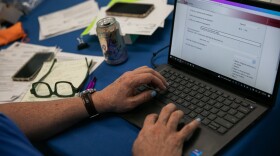
Maria Godoy
Maria Godoy is a senior science and health editor and correspondent with NPR News. Her reporting can be heard across NPR's news shows and podcasts. She is also one of the hosts of NPR's Life Kit.
Previously, Godoy hosted NPR's food vertical, The Salt, where she covered the food beat with a wide lens — investigating everything from the health effects of caffeine to the environmental and cultural impact of what we eat.
Under Godoy's leadership, The Salt was recognized as Publication of the Year in 2018 by the James Beard Foundation. With her colleagues on the food team, Godoy won the 2012 James Beard Award for best food blog. The Salt was also awarded first place in the blog category from the Association of Food Journalists in 2013, and it won a Gracie Award for Outstanding Blog from the Alliance for Women in Media Foundation in 2013.
Previously, Godoy oversaw political, national, and business coverage for NPR.org. Her work as part of NPR's reporting teams has been recognized with several awards, including two prestigious Alfred I. DuPont-Columbia University Silver Batons: one for coverage of the role of race in the 2008 presidential election, and another for a series about the sexual abuse of Native American women. The latter series was also awarded the Columbia Journalism School's Dart Award for excellence in reporting on trauma, and a Gracie Award.
In 2010, Godoy and her colleagues were awarded a Gracie Award for their work on a series exploring the science of spirituality. She was also part of a team that won the 2007 Nancy Dickerson Whitehead Award for Excellence in Reporting on Drug and Alcohol Issues.
Godoy was a 2008 Ethics fellow at the Poynter Institute. She joined NPR in 2003 as a digital news editor.
Born in Guatemala, Godoy now lives in the suburbs of Washington, DC, with her husband and two kids. She's a sucker for puns (and has won a couple of awards for her punning headlines).
-
Kids today live in an ultra-processed world: Nearly 70% of what they eat is packaged, processed and probably not great for them. Here are ways to cut back, without cooking every meal from scratch.
-
Sure, they're tasty, but packaged snacks and meals can be packed with sugar, salt and a list of unpronounceable ingredients. So what are they doing to your health? Scientists are trying to find out.
-
The U.S. desperately needs more Black and Hispanic doctors, research shows. But financial pressures and discrimination can keep young people from even applying to med school.
-
Research suggests that diversifying the ranks of physicians is critical for saving lives. A new study highlights barriers that keep determined students of color from actually making it to med school.
-
With a pandemic-era rule expiring this month, people on Medicaid will have to re-qualify to keep their coverage. Language barriers, housing instability and computer literacy could stand in their way.
-
A federal rule that prevents states from dropping people from Medicaid rolls during the pandemic expires at the end of March.
-
The platform banned food advertising, yet many videos viewed by millions of kids continue to showcase candy, soda and packaged snacks, likely affecting kids' food preferences, researchers say.
-
Child influencers have huge followings on social media. A new study finds that their videos are frequently exposing their young viewers to junk foods like candy, salty snacks and sugary drinks.
-
After months of COVID, flu and RSV infections, parents of little kids are kinda losing it. But the data shows kids have always brought home waves of respiratory illness.
-
With COVID, RSV, the flu and other bugs circulating, the last few months have been an endless cycle of illness for many families with young kids. While miserable, it's also normal in the grand scheme.






